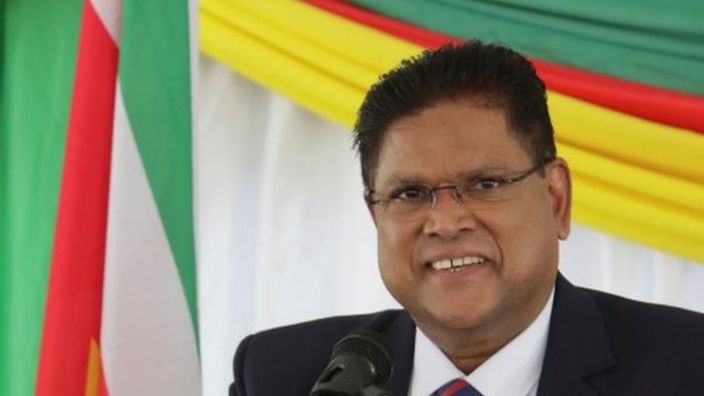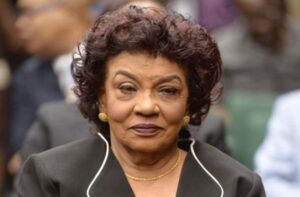
(The New York Times, 13.Jul.2020) — Desi Bouterse has cast a long shadow over Suriname since its independence. Once a dictator, he returned as a populist, but fell in the face of the pandemic and an economic crisis.
Suriname elected a new president on Monday, ending the long rule of Desi Bouterse, who dominated the small South American nation’s politics since its independence through intimidation and charisma.
The president, Chan Santokhi, a 61-year-old former police chief and leader of the opposition, was elected to the office by Suriname’s Congress following a landslide opposition victory in the May general elections.
In handing Mr. Santokhi a victory, the Surinamese punished Mr. Bouterse, a former military dictator turned populist champion, for a disastrous economic crisis and the widespread corruption in his government.
Mr. Santokhi takes charge of a deeply divided nation teetering on the verge of bankruptcy and struggling to contain the coronavirus, which has infected 741 people and killed 18.
“We’re on the brink of a financial abyss,” Mr. Santokhi said in Congress Monday, as he promised to unite Suriname’s ethnically diverse citizens. “This crisis has surpassed every worst-case scenario we had expected.”
Suriname’s longer-term prospects appear brighter, as the country is expected to begin exploiting major new offshore oil discoveries by 2026.
The new government will have to rebuild Suriname’s damaged relations with the Netherlands, Suriname’s former colonial ruler and major trade partner, whose judges had convicted Mr. Bouterse of drug trafficking in absentia in 1999.
In the last 10 years in office, Mr. Bouterse had shifted Suriname’s foreign alliances away from the Netherlands and toward China and nearby Venezuela, whose redistributive economic policies and anti-imperialist rhetoric he copied at home.
Mr. Bouterse leaves power as he appeals another criminal conviction, this time at home, for his role in the murder of 15 prominent political opponents following a 1980 military coup. Even as he loses his presidential immunity, it is unclear that he will serve the 20 year sentence the court handed down.
As police chief, Mr. Santokhi had investigated Mr. Bouterse for his role in the violence connected to the coup, a deeply traumatizing event for Suriname’s older generation known as the “December Murders.”
Some in Suriname, however, fear that trying to enforce the homicide sentence could provoke riots from Mr. Bouterse’s well-organized supporters and make the small nation ungovernable. After four decades of running the country in different guises, Mr. Bouterse retains strong connections in the Suriname’s military, commands a large personal fortune and enjoys the adoration of a loyal base.
But in a sign of conciliation, Mr. Bouterse, an elected lawmaker, made a rare appearance in Congress on Monday, where he congratulated the new government. “Out of experience, I can tell you it won’t be an easy job,” Mr. Bouterse said.
In an attempt to maintain his support ahead of elections, Mr. Bouterse raided the reserves of private banks and imposed restrictions on foreign exchange rates earlier this year. The moves proved popular with his core supporters but provoked an unprecedented backlash from the private sector and devastated an already damaged economy.
Economic mismanagement proved to be Mr. Bouterse’s undoing. The Surinamese abandoned his ruling party in droves, voting many of his chief allies out of power.
Mr. Bouterse’s top economic policymaker, Amzad Abdoel, received 117 votes out of more than 70,000 cast in his congressional district.
__________
By Anatoly Kurmanaev and Harmen Boerboom

